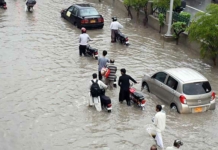Recently Moody’s has scaled down the Government of Pakistan’s debt ratings to “Caa1” from “B3” and the outlook is kept at “negative”. Under “Caa” obligations are judged to be of poor standing and are subject to very high credit risk. Pakistan’s economic outlook has deteriorated sharply in recent months. Government and global agencies are expecting downward revision in GDP growth estimates made earlier this year. Moody’s has lowered Pakistan’s GDP growth estimate to 0-1% range for financial year 2022-2023 which was in the range of 3-4 percent before the floods.
The ratio decidendi behind this is driven by above factors along with increased government liquidity and external vulnerability risks and higher debt sustainability risks, especially after the recent devastating floods that hit the country. However, the Finance Minster, Muhammad Ishaq Dar, seems surprised and unpleasant by this decision and said that he would give befitting response to the rating agency. Such response by Ishaq Dar has taken the experts by a surprise, as this is not how the global bodies work!
Pakistan’s fast depleting foreign exchange reserves are hovering around US $14 billion for last few months, limited to cover even less than two months of import bill including the recent disbursement of US$ 1.1 billion by International Monetary Fund (IMF) under Extended Fund Facility (EFF) programme. This low level of reserves limits Pakistan’s ability to substantially meet external debt servicing or import payment needs, without risking a balance of payments crisis.
The downgrading of Pakistan’s rating by Moody’s would not only impact our borrowing capacity as investors start treating us as a high risk avenue, but would also lead to increased rate of returns on funds placed with the government. The country is already facing an acute economic situation and trying to explore every possible avenue to meet the financing requirements, Pakistan’s downgraded ranking will further complicate our financial standing.
Pakistan’s bonds are already facing turbulent times. Prime Minister, Shehbaz Sharif, pleaded before the global community for a debt relief due to the impact of floods, which transmitted negative signals to global lenders while the bond markets took a dive. However, later the Finance Minister in an interview clarified that Pakistan was not seeking debt relief from commercial banks or Eurobond holders. Earlier this year in July, credit rating agency, S&P Global downgraded Pakistan’s economic outlook rating from stable to negative, an action taken on account of high inflation, continuous depreciation in rupee value as well as abject financial conditions.
Pakistan’s dependence on borrowing, grants and aids is continuously increasing, and the goal of economic stability is a distant dream. Economic stability is directly linked with political stability and unfortunately since independence Pakistan is being treated as a laboratory where different institutions have obstructed stability by various political experiments.
The four martial laws, followed by controlled democracy and a hybrid system have failed miserably to generate any positive results. However, those at the helm of affairs in judiciary and establishment are still oblivious of the reality that running a country is not their cup of tea. It is prerogative of the Pakistani people to elect their representatives, who they think are best to run the country and on failure, the voters alone have power to make them accountable through the power of ballot.
During its tenure, despite full support of the military, judiciary and law enforcement agencies, the coalition government of Pakistan Tehreek-e-Insaf (PTI), having a thin majority and that too through alliance, failed to bring any structural reforms, rather it politicised the institutions, burdened public with heavy taxes and deteriorated the economic situation to such an extreme that when it lost power, as a result of a vote of no confidence, the country was faced with the risk of default.
Subsequently, the unelected finance minister of Pakistan Democratic Alliance (PDM), Miftah Ismail, made tall claims about reforming the economy. During his brief stint, he managed to resume the EFF programme with IMF, which averted the risk of default. However, at the same time it burdened the already struggling citizens and businesses with heavy taxes and macro-economic adjustments. It, consequently, depleted the political capital of the alliance government.
Miftah’s unceremonious exit from the Q-Block paved the way for Pakistan Muslim League’s (Nawaz)—Ishaq Dar to assume charge as Federal Finance Minister for the fourth time. Since taking oath, Pak rupee, which was on a downhill slide, has been able to gain a positive momentum. Similarly, some relief is extended to the public at large by reduction in petroleum prices as well as subsidized electricity tariff for top five export sectors. However, these measures are ad-hoc in nature and are not focused towards addressing the underlying structural and policy related issues.
Since assuming office, Ishaq Dar has not shared with the nation his economic revival plan for addressing the major economic challenges. Rather he has preferred referring to his previous track record of handling these matters. There is yet no clue of a clear roadmap from Finance Minister regarding fiscal imbalances, shrinking growth, limited foreign reserves, and import restrictions—fixing these alone can help revive investors’ confidence.
Pakistan, under IMF’s programme has agreed to address the circular debt issue on priority basis. Unfortunately, we have accumulated gas sector circular debt as well which was negative in 2018. The recent IMF country report, released in September 2022, states that “by end-March 2022, a substantial CD stock of about Rs. 720 billion (1.1% of GDP) has also amassed in the gas sector only from the accumulated shortfall in revenue from below-cost-recovery prices and pending the finalization of the authorities’ ongoing cleanup of the underlying data. The main drivers are high unaccounted for gas losses (UFG), delayed sales price adjustments (since September 2020), uncovered subsidies (especially for export and zero-rated industries), and collection shortfalls”.
Similarly, power sector circular debt is also high. Another major burden on our treasury is of the state-owned enterprises (SOEs) as a major portion of our revenues dries up due to them. Ishaq Dar needs to share his plans on this front also as government has committed with the IMF to reduce the state’s footprint in running the SOEs.
Challenges before the PMLN financial wizard, Ishaq Dar, are huge such as unstable currency, declining foreign reserves, higher inflation, unemployment, shrinking growth, negative outlook of the country; but the time available is rather too short. He has double responsibility on his shoulders. On the one hand, he has to provide relief to the public at large without violating IMF agreement and on the other, to improve his party’s image which was compromised due to aggressive economic measures undertaken to avoid default. Only time will tell the fate of his policies and the goals set for economic wellbeing of the people and sustainable, all-inclusive prosperity that we have failed to achieve for the last 75 years of our existence.
__________________________________________________
Dr. Ikramul Haq, Advocate Supreme Court, specialises in constitutional, corporate, media, ML/CFT related laws, IT, intellectual property, arbitration and international tax laws. He is country editor and correspondent of International Bureau of Fiscal Documentation (IBFD) and member of International Fiscal Association (IFA). He is Visiting Faculty at Lahore University of Management Sciences (LUMS) and member Advisory Board and Visiting Senior Fellow of Pakistan Institute of Development Economics (PIDE).
Abdul Rauf Shakoori, Advocate High Court, is a subject-matter expert on AML-CFT, Compliance, Cyber Crime and Risk Management. He has been providing AML-CFT advisory and training services to financial institutions (banks, DNFBPs, investment companies, money service businesses, insurance companies and securities), government institutions including law enforcement agencies located in North America (USA & CANADA), Middle East and Pakistan. His areas of expertise include legal, strategic planning, cross border transactions including but not limited to joint ventures (JVs), mergers & acquisitions (M&A), takeovers, privatizations, overseas expansions, USA Patriot Act, Banking Secrecy Act, Office of Foreign Assets Control (OFAC).







